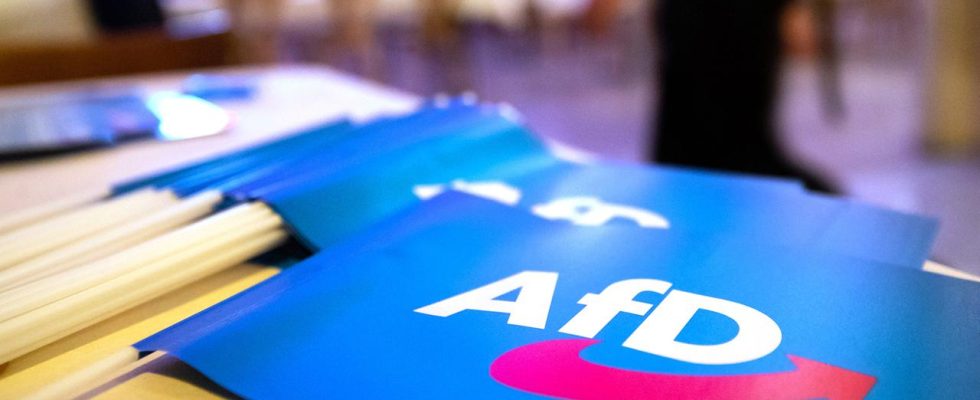exclusive
The Internet platform “Hessencam” documented some extreme statements at an AfD event. The judiciary is now taking action against the journalist in question. The DJV speaks of “excessive investigative zeal”.
The video is one minute and 17 seconds long and has been viewed more than a million times on the “X” platform, formerly “Twitter”. Several people can be seen on the street, presumably attending an AfD event in a nearby hall in the Hesse town of Rabenau-Geilshausen.
Some of them try to actively prevent the cameraman from filming. One man calls himself a “National Socialist” in front of the camera, another describes a local SPD representative whose campaign bus stopped in front of the event hall as “Dr. Mengele” because he agreed to the vaccination requirement. A longer version with further interviews has now also appeared on YouTube.
Alleged violation of the Art copyright law
This highly acclaimed recordings may now have criminal consequences for the cameraman, the freelance journalist Joachim Schaefer. His main job is as a pastoral advisor in the Catholic cathedral community of Wetzlar, but he also has a press card because he regularly conducts interviews as part of the church’s youth media project “Hessencam” – often with participants in “lateral thinker” demos or events in the right-wing milieu.
The Giessen public prosecutor’s office is now investigating him because of his filming in Rabenau-Geilshausen. The accusation: Violation of the Art Copyright Act (KUG). The authority confirmed this SWR.
In fact, the KUG also includes the so-called “right to one’s own image”. Anyone who films people without their consent and publishes the recordings can commit a criminal offense. There is a risk of a fine or even a one-year prison sentence. However, journalists can rely on exceptions in their everyday work. The consent of a person being filmed can already be given if it is clear to them that they are being filmed during the interview (so-called implied behavior). This is exactly what the police in Giessen are questioning in the Rabenau-Geilshausen case. Dem SWR She said it was filmed “from waist height” and that the cameraman “apparently did not identify as a journalist.”
The journalist vehemently contradicts this in an interview with SWR: “The camera is not a small camera, not a hidden camera. The microphone is an external microphone, so it is visible. And from a distance, every visitor has already been warned by the AfD folder: Be careful, don’t give him an interview. It “It was visible, it was public and so I can’t understand this accusation.” He also introduced himself to the organizer as the operator of “hessencam” and stated this during the interviews when asked.
DJV sees wrong signal
The German Journalists Association (DJV) is now also concerned about the case. He accuses the investigating authorities of “excessive investigative zeal”. Because: After the events in Rabenau-Geilshausen, the Gießen police initiated “ex officio” proceedings against Schaefer. A clerk also “contacted the event registrant by email to find out who the possible witnesses and victims were,” it said in a written statement.
The Giessen public prosecutor’s office approves the “identification of witnesses” as “fundamentally permissible”, even though the relevant criminal offenses are so-called petition crimes. This means that the investigative authorities actually only take action when those affected actively request criminal prosecution.
Hanna Möllers, DJV legal advisor, criticizes in an interview with SWR: “Here, the officers actively looked for witnesses and presented the matter to the public prosecutor’s office, even though it is a criminal offense and a conviction seems rather unlikely given the consideration of broadcasting and press freedom.” This sends “a completely wrong signal.”
AfD refers up to 30 people to the police
The responsible AfD district association in Giessen apparently gratefully accepted the contact from the police. After the events in Rabenau-Geilshausen, he wrote a letter entitled “Sometimes believing in the rule of law is still worth it!” to party members and other “friends” of the AfD.
The letter is there SWR before. It says that they are “looking for everyone who has been injured” by the journalist, an “AfD hunter” and one of “our fiercest opponents.” The AfD offers to forward data such as names or dates of birth “collectively to the police”. Apparently with success: “Approximately 25-30 people have now been reported to the police as potentially affected people or witnesses,” the responsible district chairman told him SWR with.
Schaefer criticizes “press bullying”
Schaefer cannot understand the investigators’ actions: “I ask myself: Is that the job of the police? Do they still have the expertise and the composure to really let the press work openly?” says Schaefer. He is very concerned that the police see him as a threat because he is concerned with protecting democracy. After the events in August, he had already experienced how a CDU politician confronted him with the investigation. Schaefer sees this as a kind of “press bullying”.
DJV legal advisor Möllers criticizes: “The freedom of broadcasting and the press requires that the police and public prosecutor’s office protect themselves against reporters who want to show the audience the true face of the AfD supporters, instead of making their work more difficult with remote investigations.”

